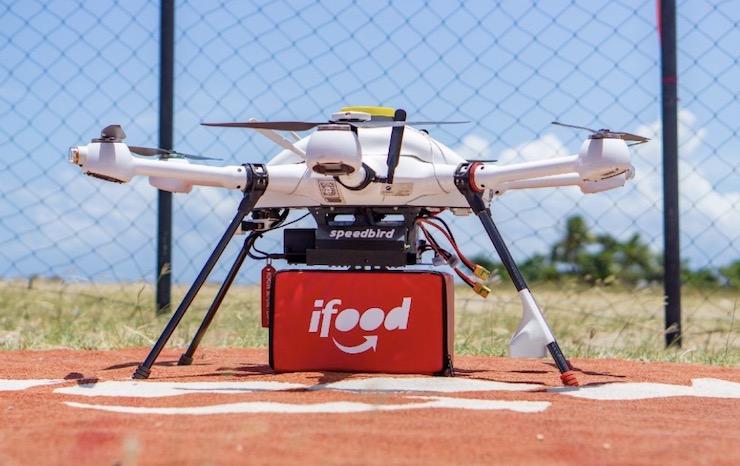
© speedbird.aero
America’s bustling remote package drone delivery market is about to get a little more crowded. The latest entrant? Brazil-based Speedbird Aero.
It’s an unusually dynamic company that began just five years ago as a small family-based technology project in Sao Paulo involving two professional associates and their wives. It has since mushroomed into a 55-person global dynamo with outsized ambitions of revolutionizing drone deliveries worldwide.
Founder Manoel Coelho comes from a family with generations of experience in aviation; after obtaining an advanced degree engineering it wasn’t long before Coelho immersed himself in the same field, working for the Phoenix-based global telemedicine company, MedAire, which provides emergency medical training, equipment and remote medical advice for the aviation and maritime industries. That experience also exposed him to US business methods and models and helped fuel his passion for global entrepreneurship.
It was his co-founder, Jose Salamao, however, who really sparked his interest in unmanned aerial aircraft. The two met at another firm Global Med, a comprehensive and scalable telemedicine solutions company, where Coiho served as head of global business development. Salomao had responsibility for systems software. Together, the two orchestrated worldwide deployments for the company’s major clients including the US Veterans Administration, Department of Defense and NATO.
It wasn’t quite drones, but it was close.
In the course of their work, Salamao began noticing a large number of healthcare “deserts” beyond the reach of conventional road and air transport. He struck upon the idea for a drone company, but their initial US fundraising efforts failed – miserably. Undeterred, the two men went back to Brazil more determined than ever to fulfill their own entrepreneurial drone vision – somewhere.
Once they got started, they found a warm reception from investors in their homeland. But they still had to peddle their prototypes door-to-door and strut their stuff to finally convince Brazi’s aviation regulators to grant them permission to launch. But once they did, they started setting one precedent after another, becoming the nation’s first drone supplier to receive BVLOS authority to conduct flights not just of medical supplies but of food products in close partnership with the tech giant, iFood. Trust in the firm was so great that it soon began transporting biohazardous substances across the country, too. In just two years, Speedbird Aero had become Brazil’s flagship.
Another milestone came when Coehlo and Salamao traveled to Israel in search of global partners. It took humility, Coelho recalls, and a willingness to learn from others more innovative and experienced drone companies than their own. But their receptive attitude soon won the company new friends in high places. Speedbird became the first foreign company to participate in Israel’s National Drone Initiative BVLOS pilot project demonstrations, and later set a record for the longest BVLOS flight (16 kms) from the country’s busiest national airport.
Today, Speedbird Aero’s still evolving drone fleet consists of three distinct UAV airframes geared to different payload and flight distance requirements. The first to be developed, DLV1, is a lightweight axle rotorcraft that can carry up to three kilograms (6.6 pounds) of payload. The second is the DVV2, first a heavier cargo lift axle rotor drone that can carry almost three times the weight and fly three times the range of the DLV1. The two drones have already flown 10,000 missions to date. A third drone, still in late-stage development, and geared to special missions, is scheduled to come online later this year.
Thanks to their sterling track record, Coelho and Salamao feel they have a real advantage over U.S. drone companies like Amazon and Walmart that have recently begun piloting their remote package delivery operations but have faced persistent delays due to safety and noise concerns. Officials at the Federal Aviation Administration (FAA) have already taken notice of the Brazilian upstart. Last year, the FAA invited Speedbird Aero to join its BEYOND program, which is intended to advance stakeholder discussions of how best to regulate BVLOS flights and to establish an unmanned air traffic management system. It’s the first foreign done company to be invited to the discussions, yet another sign of Speedbird’s rising credibility.
Coelho is wasting no time positioning Speedbird for still greater things to come. He now divides his time between Brazil and his new headquarters in Florida, where he’s beginning to lay the groundwork for new drone production facilities and a US-based marketing campaign. He’s also begun discussions with civil aviation authorities in Europe where the large cargo drone market is rapidly expanding. Industry observers say it won’t be long before Speedbird Aero is mentioned on the same breath with the likes of Zipline and Wing, but with even greater potential to dominate the US market.
|